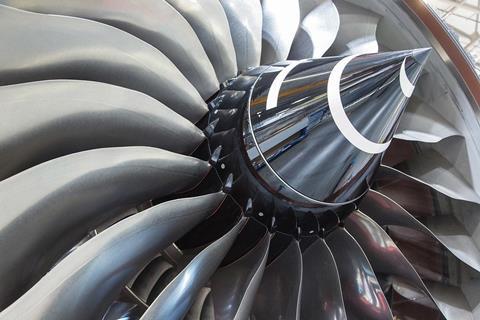Rolls-Royce is to ensure all in-production civil aircraft engines are proven compatible with wholly-sustainable fuel by 2023, as part of near-term measures to achieve decarbonisation targets.
The manufacturer states that, under the strategy, it will enable its products to be “used in a way that is compatible” with net-zero carbon.
All new products will be compatible by 2030, it says, while all products in operation will be compatible by 2050.
“Wholesale transformation of the systems that make up the backbone of our global economy is required to achieve net zero,” says the company.
It adds that it can “accelerate” this transition by using next-generation technologies to advance its engine portfolio, improving the economics of sustainable fuels, and by introducing new low- or zero-emission products – such as fuel cells, microgrids, hybrid-electric and all-electric systems.
Rolls-Royce will test all its in-production civil aircraft engines to make them compatible with 100%-sustainable aviation fuel by 2023.
This means two-thirds of its Trent large jet engines and three-fifths of its business jet engines – based on the pre-pandemic in-service fleet at the end of 2019 – will be compliant within three years.

Rolls-Royce says this “aligns” with United Nations ambitions for 10% of all aviation fuel being sustainable by 2030.
“We will work with our customers in the armed forces to achieve the same goal for the Rolls-Royce engines they use,” the manufacturer adds.
“As the use of [sustainable fuels] increases, we will ensure that our future combat systems are compatible with net-zero carbon.”
Rolls-Royce’s measures also cover other sectors to which the company supplies systems, including shipping and energy, pointing out that its products power “some of the most carbon-intensive parts of the economy”.
“We pioneer power that is central to the successful functioning of the modern world. To combat the climate crisis, that power must be made compatible with net-zero carbon emissions,” says chief executive Warren East.
“This is a societal imperative as well as one of the greatest commercial and technological opportunities of our time.”
Rolls-Royce is increasing the proportion of research and development expenditure aimed at lower-carbon technologies from 50% to 75% by 2025.
As part of the strategy the company is decarbonizing its operations, intending to eliminate emissions by 2030 – it claims its Bristol production site will achieve net-zero carbon status next year. Rolls-Royce also points out that its executive remuneration policies are tied to achieving all its 2023 targets.


























